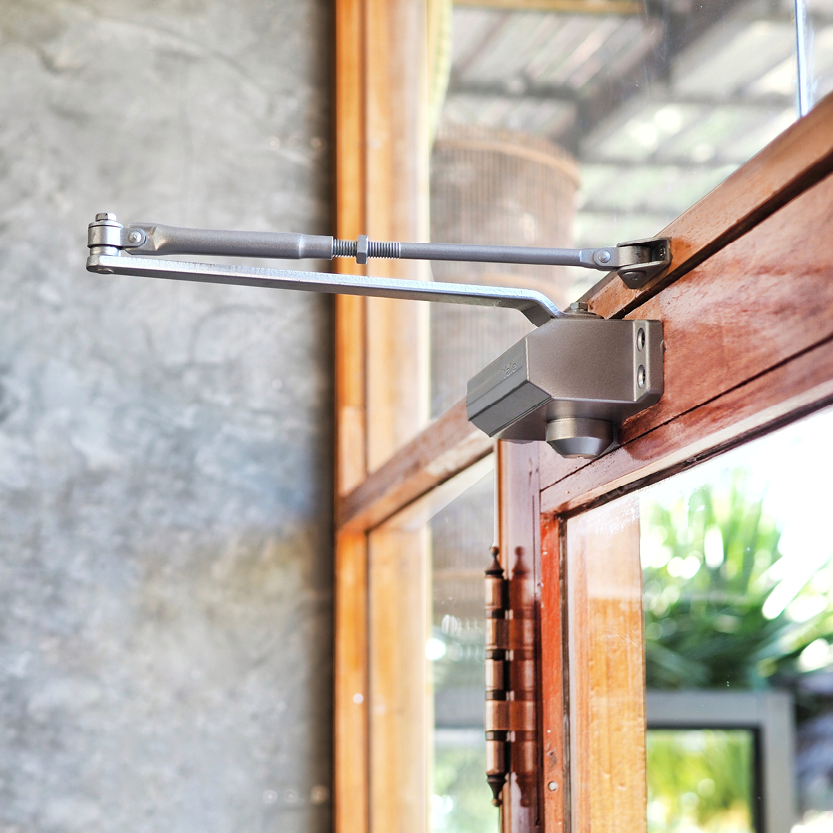When purchasing door closers for commercial buildings, residential projects, or bulk export, one of the most common questions buyers ask is:
“Why does the door closer price vary so much across suppliers?”

Some models are as low as $5, while others reach $15 or more for similar-looking products.
But behind those numbers lie key differences in materials, engineering, features, certifications, and even after-sales support.
In this article, we break down the real cost structure behind every door closer to help you make smarter purchasing decisions—whether you’re sourcing in bulk from China or comparing suppliers worldwide.
🔩 1. Material Quality: The Hidden Backbone of Price
The material used in a door closer directly affects its strength, durability, and cost.
Main cost-driving materials include:
- Body casing: Usually die-cast aluminum. Higher aluminum content or thicker shells cost more but offer better corrosion resistance and load-bearing.
- Hydraulic fluid: Imported hydraulic oil with anti-freeze and anti-leak properties is more expensive but ensures smooth operation in all climates.
- Valves & springs: Copper valves, hardened steel pistons, and heat-treated internal components contribute to longer lifespan—and higher price.
👉 A $3 product may look similar in shape to a $9 model, but internal quality often differs significantly.
🛠️ 2. Manufacturing Process: Precision Comes at a Cost
High-performance door closers go through more precise machining, stricter QC standards, and higher-grade assembly.
Key process differences include:
- CNC-machined valve systems (instead of rough die casting)
- High-precision oil cylinder tolerance (prevents leakage)
- Fully enclosed oil circuits vs semi-open cheap versions
- 500,000+ cycle tests vs 100,000 cycles in budget models
Suppliers who use advanced machinery and invest in skilled labor inevitably offer higher door closer prices—but with better reliability and less product failure rate.
⚙️ 3. Features & Specifications: More Functions, Higher Price
Door closers can vary widely in functionality. Basic models offer fixed force and simple closing; advanced models offer a range of adjustable or intelligent features, such as:
| Feature | Effect on Price |
|---|---|
| Adjustable Closing Speed | Slightly Higher |
| Adjustable Latching Speed | Standard |
| Backcheck Function | +15–20% |
| Delayed Closing | +10–15% |
| Power Size EN2–EN6 Range | Increases cost by size |
| Fireproof/Smoke-rated Certification | Significant price impact |
A fire-rated EN4 hydraulic closer with backcheck and delayed action could be double the price of a basic EN2 fixed-force model.
🧾 4. Certifications & Compliance
If you’re selling or installing closers in regulated markets like Europe, USA, or the Middle East, certifications add to both value and price:
- CE / EN1154 (Europe)
- UL-listed (USA)
- BSI / ANSI / ADA (UK, international)
These require extensive lab testing, factory audits, and quality documentation, all of which increase unit cost but ensure product acceptance in commercial tenders or government projects.
📦 5. Custom Branding & Packaging
For OEM clients, customized options like:
- Logo laser engraving or stamping
- Branded color boxes / manuals
- Special finishes (black, bronze, stainless steel look)
- Eco-friendly or foam-insert packaging
…will increase per-unit door closer price, especially for small or mid-sized orders.
👉 But professional packaging can also increase product perceived value, helping you win more end-users or resellers.
🚚 6. Trade Terms, Logistics & Order Volume
The final price you pay depends not just on the door closer itself, but on:
- MOQ (Minimum Order Quantity) — Higher volumes = better pricing
- FOB vs CIF vs EXW trade terms
- Packing method (bulk or individual boxes)
- Shipping port distance
- Fuel costs and container rates
A $6 factory quote under EXW terms could turn into $9–$10 delivered if international freight and customs are included. Always clarify what’s included in the quoted price.
💡 Summary: Don’t Just Compare Price — Compare Value
When evaluating a door closer price, ask yourself:
- What’s the internal material quality?
- Is the product tested or certified?
- Does it have the functions your project needs?
- What’s the expected service life and maintenance cost?
📌 Choosing the cheapest option may save money upfront but lead to complaints, replacements, and brand damage later.
Paying a few extra dollars often means:
- More durable products
- Better safety compliance
- Smoother installation
- Lower total cost of ownership
📩 Get Transparent Pricing from Us
At [Your Brand Name], we offer:
- A complete range of commercial and residential door closers
- Competitive prices based on function, order size, and trade terms
- CE, UL, and EN-compliant models available
- OEM/ODM support for your brand
- Free samples and fast production lead time
Send us your requirements today and get a clear, itemized quote with recommendations tailored to your market and budget.
